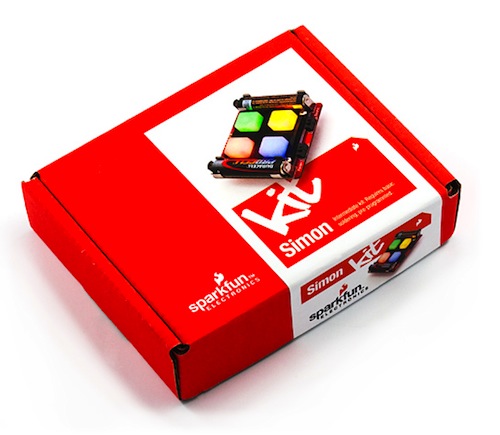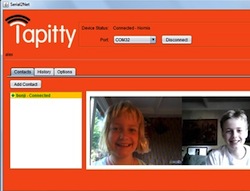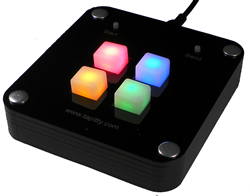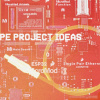Wow - Maker Faire San Mateo was a lot of fun! Judging from the crowds it seems safe to say that that was the biggest Maker Faire yet. It was an awesome experience meeting many of our customers, teaching workshops, and checking out all the amazing projects the DIYers are building. We'll have a full recap shortly, but first let's talk about one of the projects we found that has a special place in our heart - Tapitty!

Tapitty is based off the SparkFun Simon.
Tapitty is built off of our very own Simon Kit. Using the Simon as an interface, Tapitty lets you you play a game called Nomis interactively with your friends. Essentially you have two Simon games connected to eachother. Instead of the computer creating a pattern you have to mimic, you create a pattern for your counterpart to attempt to copy. Who can remember the longest pattern and go the longest?! It's a heck of a lot of fun.


The video interface and the game control.
Tapitty also features an interactive video client so you can see your friend's reaction as he/she tries to mimic the pattern you've created. It's a very nice project and a ton of fun to play! Nice work!







Hi Everyone:
Thank you for your comments! As TeslaFan states ""Tappity" isn't the game. NOMIS is the game, Tappity is the service that NOMIS, a test application in the form of a game, runs on." And I was hoping that people saw Nomis as a good example of re-purposing the Sparkfun Simon game.
As for the service angle I appreciate the advice that I need to explain more on the partners page. Tapitty provides the developer with networking functionality that is as easy as simply passing credentials through without any TCP-IP or networking knowledge, and without any need for additional hardware like Ethernet shields, XBees, etc. (just use your standard USB connection). We also host the Arduino compiler on the cloud, provide the ability to update all deployed devices, provide a user client that has video built in with Skype like functionality for managing user connections, etc.
I appreciate your support.
Ted@Tapitty
Well, that clears things up a bit. +1
Now that is a neat idea, you definitely need to update your web site.
If I were to build some device or game, say perhaps a robot and a laser tag gun, you could post the build instructions, use Tapitty to deploy your software and provide the communication, thus you could play laser tag remotely by using the video.
I see no problem with this at all.
It's not like ALL they have is a "Simon" game. In fact, that seems to only be the sample app.
What they're selling is a connection protocol.
More accurately, Emcee Grady's description of the system doesn't seem accurate.
"Tappity" isn't the game. NOMIS is the game, Tappity is the service that NOMIS, a test application in the form of a game, runs on.
Perhaps a more informative web site would help.
Pretty cool to see the open-sourcey-ness of Sparkfun's products getting exercised. Well done to Tappity, even if they never gross dollar 1.
Well done to Sparkfun for being a leader in open source hardware. Sparkfun makes money (and has fun) inventing and selling the kit, Tappity makes money (and has fun) extending it, and perhaps some joy is brought to the world by people playing the thing.
You gotta be kidding me.
Connecting two simons head to head in person and doing this might be ok. Going through a web interface, which requires a subscription for their site access (1 year of which, valued at $19.95, being included in the $65 price of ONE Nomis...) A Simon kit is only $25, this basically just throws it in an enclosure and adds the web software for $40 more, close to tripling the price. In this day and age of online gaming just how long are the kiddies gonna be entertained by pressing 4 light-up buttons and watching their friends giggle? And what's up with that "Tappity Touch", now you can give your loved ones the middle finger remotely with a hinged wooden block?
C'mon Sparkfun, quit "suggesting" this stuff.
I posted about this project primarily because it's a well-done "repurposing" of the SparkFun Simon Kit.
Since we first started selling the kit, we have encouraged people to hack it to fit their needs. We've seen it used as a simple video game controller, an RC car controller, and even used to move a robotic arm. I like that he took our product and made it his own - it certainly fits into the scope of why we make our products open source. If the prices he wants are too high, the market demand will tell him.
We're not in the business of advertising for people's products on our homepage, so I'm not necessarily "suggesting" this as something for everyone to run out and buy (though I personally wouldn't blame you - I think it's awesome), but because it might inspire someone to build something cool.
Thanks for your comments!
I'm with Grady...I don't think this was about 'RUN OUT AND JOIN NOW!' but more or less...this a cool use of our product!!!
and all you are right, kids will get sick of this in under a minute, just as us older folk got tired of the original Simon in under a minute!!! But this along the lines of proof of concept rather than a Halo killer!
Can any of you stand there and say this was not an novel use of an existing product? Yeah, Thingspeak and that other service(which I can't remember the name of) seem to be way better alternatives to tappity, and tappity does seem to be rushed, but I always like to have choices, the more the better.
lets try to remember that the OSH is only part of the 'MAKER MOVEMENT', and the Maker movement isn't only for those that have PHD's and have been hacking/creating for twenty years. It's also for newbies(which I am one) and kids alike.
further, I see no where on that page where they embrace OSH, other than the fact that they use an arduino. Another fact to remember is OSH is about the ability to create and adapt hardware that has been been let loose in the open source arena, not what you do with the products after the fact. If I use a stock arduino to create a a GPS logger, it doesn't automatically fall under open source unless I choose to do so. Now if I am actually modifying the arduino to fix a problem or add a feature, then yeah that will fall under open source.
this is my understanding of OSH, please correct me if I am wrong.
The point of opensource hardware and software is to allow the common person to develop the device without exclusion. Requesting money from developers is a form of exclusion. Perhaps asking for small donations would be a better approach.
Tell that to the thousands of paid programmers who make Linux possible.
There is no reason why open source can't cost money, both to develop it and to distribute it. I'd gladly spend all day designing open source stuff, but I'd need to pay my bills. If someone paid me a salary to make open source things, the world would have lots more nice things. If someone is willing to pay that, it doesn't change the fact that the thing is open source. Hell, almost all of the open source things on this site are designed by people who are being paid to design them.
Don't confuse free as in speech with free as in beer.
EDIT: Or wait... are they asking you to pay to be a developer? That doesn't even make sense... I assumed it was some kickstarter thing or something.
my only question is when will their be a maker faire in Denver or Boulder, because i am a local here and i dont have the money to travel to all of these places
there should be one in minneapolis or st. paul! Conference and event capitol of the midwest! C'mon...
Wait, it's a 're-purposed' open source hardware item that requires a service to use? Or am I misunderstanding it (ie, not OSHW or doesn't require the service to use)? If that's true isn't it similar to what Tivo did - use OS software, release the source but don't let anyone actually USE it because it requires a key they're not giving out to modify the only platform it will run on? I realize that OSHW may not actually exclude this (like GPLv2 didn't) but this whole thing just feels slimy to me.
I misread: Taptitty ...
nope, two too many buttons for that game.
The "nomis" game is, well... it seems more like an example app than a game itself. The arduino-to-arduino webservice is certainly interesting to contemplate however. It could be like ThingSpeak with a shopping cart. One to play, one to get paid.
Given that I've been playing around with an embedded project that would be benefit greatly from a network interface, this is great. The only way I could figure out previously to reasonably support a web interface for others was ad-supported, and this may be a decent way to create a premium alternative.
Well, maybe. The paucity of information they provide about their "developer network" is less than encouraging. Maybe once they are willing to explain what they are providing before you set up an account...
OMG that guy on the right looks EXACTLY like my little arrogant nemesis down the street, Alexander.
Whoa, is someone who lives in my neighborhood on here? I don't see any other reason someone would like that comment...
huh. now the like is gone. MmYySsTtEeRrIiOoUuSs...
Not commenting about the Simon Kit or the placement of the link on the Sparkfun front page, but about the actual Tapitty service itself.
Pricing of the service aside, I would like to see more technical information about the Tapitty project itself (on its own webpages). Unfortunately this is not the case. I am probably not alone in saying that the lack of information is a turn-off for me. How does it do this? What are my requirements? None of this is immediately available. Not a good start to a project with aspirations (that should be obvious from the price of admission ...)
Sorry to start on a negative point, but paying $39.99 to develop for them kind of defeats the point of open source
No it doesn't. I think people here have some unfounded illusions about what "open source" entails.
Open source software/hardware simply means:
- You have free access to the design/source
That's it.
Tapitty is providing development services for people to be able to develop network-enabled Arduino apps, as well as the infrastructure to charge for such services or code. It is using open source hardware, but is not an open source provider--hardware or software.